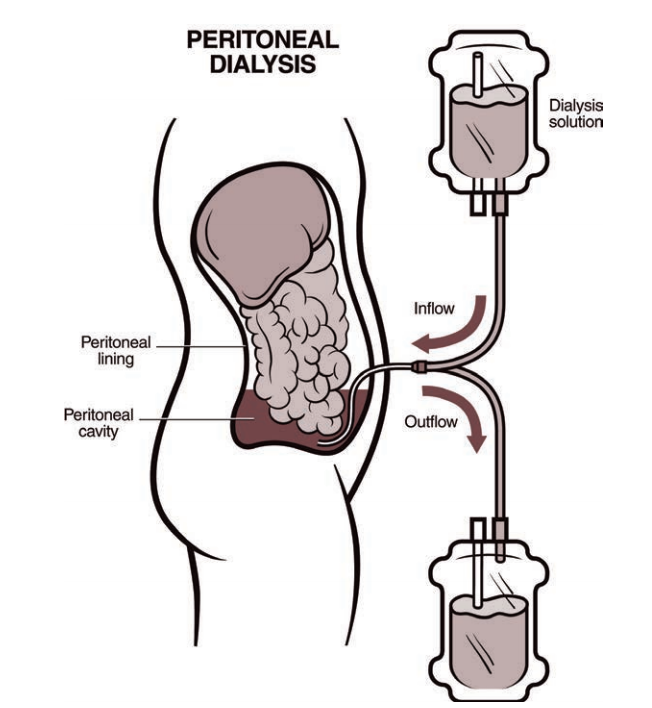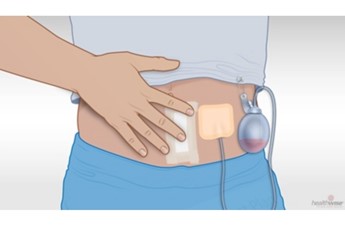A client is receiving continuous ambulatory peritoneal dialysis since the arteriovenous (AV) graft in the right arm is no longer available for use for hemodialysis. The client has lost weight, has increasing peripheral edema, and has a serum albumin level of 1.5 g/dL (15 g/L). Which intervention is the priority for the nurse to implement?
Serum Albumin Reference Range: 3.5 to 5.5 g/dL (35 to 55 g/L)
Recommend the use of support stockings to enhance venous return
Ensure the client receives frequent small meals containing complete proteins
Evaluate patency of the AV graft for resumption of hemodialysis
Instruct the client to continue to follow the prescribed rigid fluid restriction amounts
The Correct Answer is B
Choice A reason: Support stockings may help with peripheral edema, but they are not the priority intervention for this client. The client's low serum albumin level indicates malnutrition and increased risk of infection and poor wound healing.
Choice C reason: Evaluating patency of the AV graft is not the priority intervention for this client because the client is receiving peritoneal dialysis, not hemodialysis. The AV graft may be used in the future if peritoneal dialysis fails, but it is not an immediate concern.
Choice D reason: Instructing the client to follow fluid restriction amounts is important for peritoneal dialysis patients, but it is not the priority intervention for this client. The client's low serum albumin level indicates that fluid restriction alone is not sufficient to manage fluid balance and prevent edema.

Nursing Test Bank
Naxlex Comprehensive Predictor Exams
Related Questions
Correct Answer is C
Explanation
Choice C is correct because observing the incision site of a client who was discharged home with a suprapubic catheter can help detect signs of infection, bleeding, or healing problems. The nurse should inspect the incision site for redness, swelling, drainage, or odor and report any abnormal findings.
Choice A is incorrect because measuring abdominal girth of a client who was discharged home with a suprapubic catheter is not necessary unless there are signs of urinary retention or obstruction. The nurse should monitor the urine output and color and report any changes.
Choice B is incorrect because assessing perineal area of a client who was discharged home with a suprapubic catheter is not necessary unless there are signs of infection or irritation. The nurse should instruct the client on how to keep the perineal area clean and dry and report any discomfort or discharge.
Choice D is incorrect because palpating flank area of a client who was discharged home with a suprapubic catheter is not necessary unless there are signs of urinary tract infection or kidney involvement. The nurse should ask the client about any pain or tenderness in the flank area and report any positive findings.

Correct Answer is C
Explanation
Choice A: Centering attention on positive upbeat music is not a specific instruction for the nurse to include, as this is a general coping strategy that may or may not be helpful for this client. This is a distractor choice.
Choice B: Finding outlets for more social interaction is not a relevant instruction for the nurse to include, as this may not address the underlying causes of anxiety or stress for this client. This is another distractor choice.
Choice C: Practicing using muscle relaxation techniques is an appropriate instruction for the nurse to include, as this can help reduce physical tension and promote calmness and relaxation for this client. Therefore, this is the correct choice.
Choice D: Thinking about reasons the episodes occur is not a helpful instruction for the nurse to include, as this can increase rumination and anxiety for this client. This is another distractor choice.
Whether you are a student looking to ace your exams or a practicing nurse seeking to enhance your expertise , our nursing education contents will empower you with the confidence and competence to make a difference in the lives of patients and become a respected leader in the healthcare field.
Visit Naxlex, invest in your future and unlock endless possibilities with our unparalleled nursing education contents today
Report Wrong Answer on the Current Question
Do you disagree with the answer? If yes, what is your expected answer? Explain.
Kindly be descriptive with the issue you are facing.
